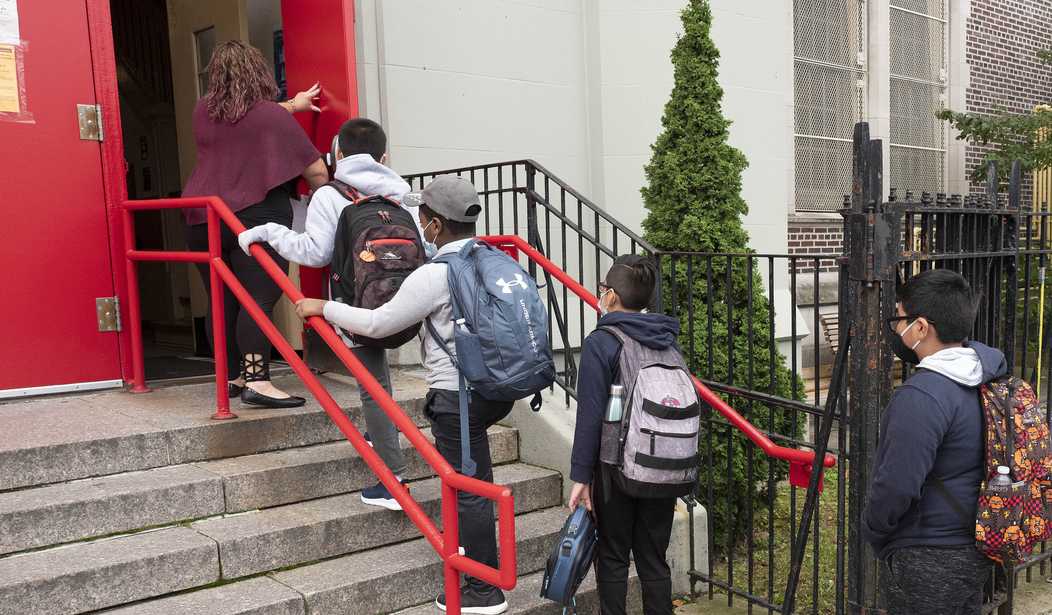The San Diego Unified School District has a brilliant new idea to erase racism: abolish traditional grading. Or something like that. It’s not exactly clear. This much is clear, however: It’s super woke.
“This is part of our honest reckoning as a school district,” San Diego Unified School District Vice President Richard Barrera told a local NBC affiliate. “If we’re actually going to be an anti-racist school district, we have to confront practices like this that have gone on for years and years.”
What, exactly, is racist about traditional grading? No one knows. In fact, it’s not entirely clear just how thoroughly the San Diego school district is overhauling its grading system.
Yet district officials appear to believe that certain “practices” are racist: practices like grading students based on their average scores across multiple assignments, practices like requiring kids to turn in papers on time, practices like actually requiring students to show up for class.
Never fear, racial minorities, students in San Diego will no longer be penalized for failing to complete assignments and teachers will be required to give them extra opportunities to demonstrate “mastery” of subjects.
“Common grading practices such as averaging a student’s grade over time can disadvantage students who started the year behind grade level and can discredit the progress a student has made, experts have said,” The San Diego Union-Tribune reported, in paraphrasing the reasoning.
Reason‘s Robby Soave rightly pointed out that the new approach is rather confusing. The school district will still use letter grades, but the grades will ostensibly reflect students’ “mastery” of the subject rather than their completion of homework, quizzes, and tests. It remains unclear just what “mastery” means.
Grades “shall not be influenced by behavior or factors that directly measure students’ knowledge and skills in the content area.” How could grading not become subjective in such a system? Even attendance can no longer be considered in the grading process.
These reforms seem like desperate attempts to do “something” as opposed to targeted efforts to truly reduce racial disparities.
Yet the district insisted that such change was necessary, citing data showing that minorities received more Ds and Fs than white students. Only 7 percent of white students received failing grades, while 23 percent of Native Americans, 23 percent of Hispanics, and 20 percent of black students did so. However, another minority had an even lower fail rate than white students: only 6 percent of Asian students received failing grades.
As Soave pointed out, reforms to the grading system do not “eliminate the underlying inequities that produced the disparate Fs.” In fact, a more subjective system may end up merely papering over the underlying inequalities.
“Given that grades are a tool for evaluating students’ progress, the district is essentially announcing that it will no longer gather as much evidence about the negative social phenomena it would probably like to address,” Soave argued. “Better grades do not mean students will suddenly have a better grasp of the material. They certainly won’t be better prepared for college (where traditional grades are very much still a thing).”
Minority students who are falling behind their classmates will still be failing even if their teachers refuse to give them bad grades.
Tragically, California progressives seem intent on eliminating grades and standardized testing. California’s public universities announced that they would phase out the use of the SAT and ACT after 2022 because white students have historically overperformed on these tests.
Yet, as Soave noted, standardized tests may give underprivileged students a way to circumvent the advantages of their peers. “Other admissions criteria—such as legacy considerations and extracurricular activities—favor privileged applicants even more dramatically than grades and tests do. The wealthiest (and usually whitest) students have better access to résumé-padding activities; yes, they can also hire tutors and take test prep courses, but there’s only so much extra value to be extracted from these things.”
It seems the San Diego School District is more interested in virtue signaling than actually helping students. In fact, the schools are only open for a handful of special-needs students, in an attempt to combat the spread of the coronavirus pandemic.
Over in San Francisco, the school district is considering changing the names of schools to remove figures who might be tangentially related to racism, sexism, homophobia, transphobia, or whatever recent historical opinion must be demonized on account of political correctness.
A San Francisco father’s response to the name changes seems particularly apt for the San Diego grading system changes, too.
“We’re not actually helping disadvantaged children by changing the name of the school they can’t attend,” Jonathan Alloy told the San Francisco Chronicle.
It seems San Diego isn’t exactly helping disadvantaged kids by making grading more subjective for the classes they can’t attend in person.
Tyler O’Neil is the author of Making Hate Pay: The Corruption of the Southern Poverty Law Center. Follow him on Twitter at @Tyler2ONeil.









